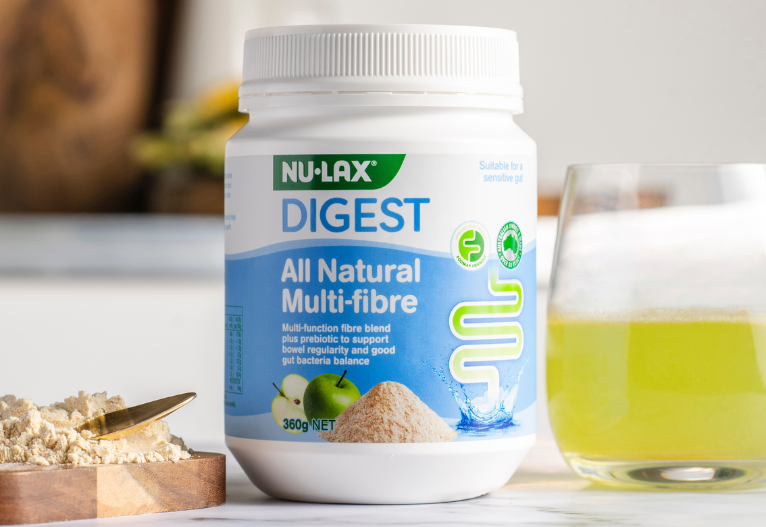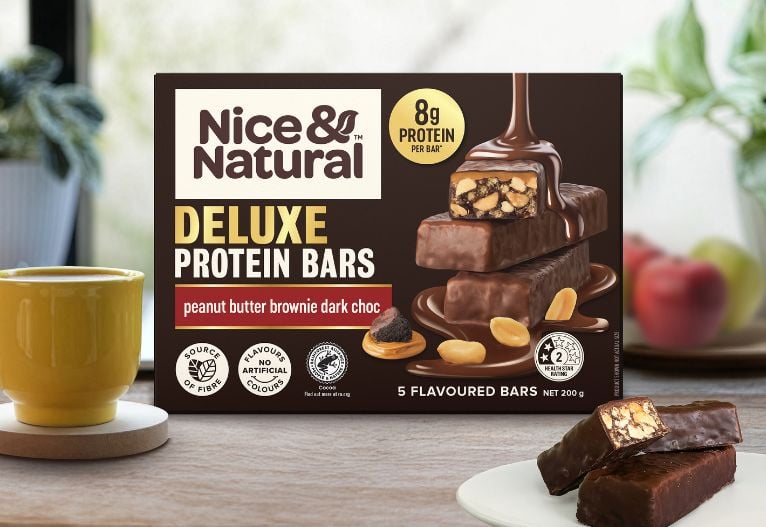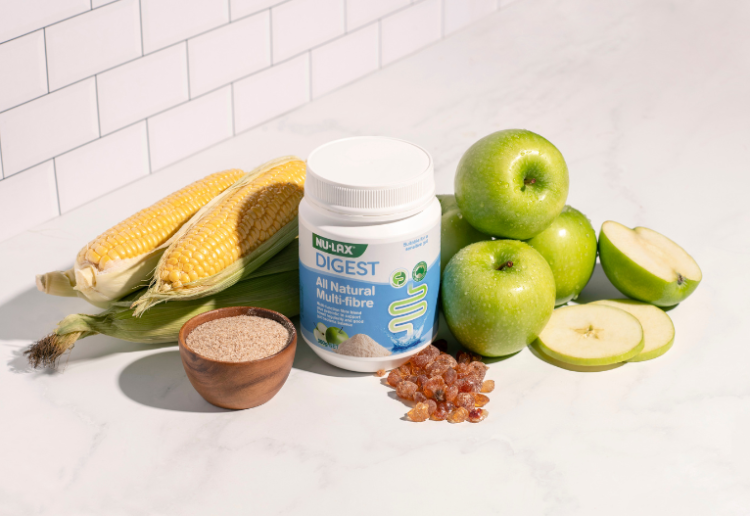Dietary fibre may not have received as much attention as probiotics for gut health, but fibre plays a major role in our digestive system and its impact on our overall health, and disease prevention should not be underestimated. In fact, dietary fibre may be the gut health hero that you’re missing.
What is fibre?
Dietary fibre is a non-digestible carbohydrate that gives plants their structure. Unlike most carbohydrates that are broken down for energy, fibre passes through our digestive tract undigested.
Consumption of dietary fibre has many benefits from protecting against cardiovascular diseases, stabilising cholesterol, and regulating blood sugar levels, to assisting with weight management and promoting regular bowel movements.
Depending on age, children require 14-22g of dietary fibre daily and adults need to eat to 25-30g to experience the health benefits associated with its consumption. But most Australians don’t consume nearly enough fibre to optimise their health and reduce the risk of issues associated with low-fibre diets such as cardiovascular disease, diabetes, and gastrointestinal disorders such as Irritable Bowel Syndrome (IBS) and Small Intestinal Bacteria Overgrowth (SIBO).
With our busy, modern lifestyles, reaching the daily fibre target can prove challenging through diet alone. Quality fibre supplements, like Nu-Lax Natural Multi-fibre which includes several forms of fibre, can help boost our fibre intake.
Why fibre is a key ingredient to gut health

Our gut is populated with over 100 trillion microbes creating an inner eco-system. A balanced and diverse gut microflora is essential for normal immune development, metabolic health, regulated mental functioning and keeping inflammation at bay.
Dietary fibre plays a significant, and perhaps underestimated role, in the development of a healthy, diverse gut microflora. Beyond keeping us regular, fibre nourishes the intestinal barrier, fuels our colon cells, and protects the overall integrity of our digestive tract.
Unlike probiotics that populate our gut with live bacteria, many fibres act as prebiotics feeding our microbiome’s beneficial bacteria. Without fibre, we’re starving our good bacteria. Species fail to thrive, and the bacterial balance is disrupted. This results in a gut microflora that lacks diversity leading to reduced gut resilience and may spell problems for our health and wellbeing.
Not all dietary fibres are equal
Different types of fibres play different roles in the digestive system and feed particular beneficial bacteria. We need all types of fibre in our diets to maintain a thriving digestive system and in turn, optimise our overall health.
Based on their structure and function in our bodies, experts have identified several essential fibre types.
Below, we explain the different fibre varieties identified and the benefits of incorporating them into our diets.
- Soluble fibre – dissolves in water and helps to slow digestion. Regular consumption of soluble fibre may help regulate our blood sugar levels and lower our cholesterol by sweeping our gut from toxins.
- Insoluble fibre – doesn’t dissolve in water and helps to bulk up stool volume. It improves motility, promotes regularity, and helps prevent constipation.
- Viscous gel-forming fibre – helps to keep you feeling full for longer and reduces our appetite. This form of fibre also aids healthy bowel function and regularity by lubricating the bowel.
- Prebiotic fibre – encourages pathogen balance so that the “good” bacteria thrive. Prebiotic fibres are the fuel for beneficial bacteria to produce health-promoting metabolites that are essential for many processes in the body including energy production, blood sugar balance, and immune function while supporting overall intestinal health.
Eating a diverse diet rich in plant foods, or supplementing to bridge the gap, can help to ensure you’re feeding your bacteria a range of different types of dietary fibres helping to grow a diverse, resilient gut microbiome.
If you’re struggling to incorporate these essential fibre varieties into your day, taking a quality formulated supplement may help you meet your fibre needs. Nu-Lax Natural Multi-Fibre combines soluble, insoluble viscous gel-forming and prebiotic fibres into a nourishing powder to support gut health.
1 Barber, T. M., Kabisch, S., Pfeiffer, A., & Weickert, M. O. (2020). The Health Benefits of Dietary Fibre. Nutrients, 12(10), 3209. https://doi.org/10.3390/nu12103209
2 Barber, T. M., Kabisch, S., Pfeiffer, A., & Weickert, M. O. (2020). The Health Benefits of Dietary Fibre. Nutrients, 12(10), 3209. https://doi.org/10.3390/nu12103209
3 Fibre | Nutrition Australia https://nutritionaustralia.org/fact-sheets/fibre-2/
4 Fayet-Moore, F., Cassettari, T., Tuck, K., McConnell, A., & Petocz, P. (2018). Dietary Fibre Intake in Australia. Paper I: Associations with Demographic, Socio-Economic, and Anthropometric Factors. Nutrients, 10(5), 599. https://doi.org/10.3390/nu10050599
5 Gill, S.K., Rossi, M., Bajka, B. et al. Dietary fibre in gastrointestinal health and disease. Nat Rev Gastroenterol Hepatol 18, 101–116 (2021). https://doi.org/10.1038/s41575-020-00375-4
6 Myhrstad, M., Tunsjø, H., Charnock, C., & Telle-Hansen, V. H. (2020). Dietary Fiber, Gut Microbiota, and Metabolic Regulation-Current Status in Human Randomized Trials. Nutrients, 12(3), 859. https://doi.org/10.3390/nu12030859
7 Cronin, P., Joyce, S. A., O’Toole, P. W., & O’Connor, E. M. (2021). Dietary Fibre Modulates the Gut Microbiota. Nutrients, 13(5), 1655. https://doi.org/10.3390/nu13051655
8 Healey G, Murphy R, Butts C, Brough L, Whelan K, Coad J. Habitual dietary fibre intake influences gut microbiota response to an inulin-type fructan prebiotic: a randomised, double-blind, placebo-controlled, cross-over, human intervention study. Br J Nutr. 2018 Jan;119(2):176-189. doi: 10.1017/S0007114517003440. Epub 2018 Jan 8. PMID: 29307330.
9 Samuel M. Lancaster, Brittany Lee-McMullen, Charles Wilbur Abbott, Jeniffer V. Quijada, Daniel Hornburg, Heyjun Park, Dalia Perelman, Dylan J. Peterson, Michael Tang, Aaron Robinson, Sara Ahadi, Kévin Contrepois, Chia-Jui Hung, Melanie Ashland, Tracey McLaughlin, Anna Boonyanit, Aaron Horning, Justin L. Sonnenburg, Michael P. Snyder. Global, distinctive, and personal changes in molecular and microbial profiles by specific fibers in humans. Cell Host & Microbe, 2022; DOI: 10.1016/j.chom.2022.03.036
10 Wanders AJ, Mars M, Borgonjen-van den Berg KJ, de Graaf C, Feskens EJ. Satiety and energy intake after single and repeated exposure to gel-forming dietary fiber: post-ingestive effects. Int J Obes (Lond). 2014 Jun;38(6):794-800. doi: 10.1038/ijo.2013.176. Epub 2013 Sep 13. PMID: 24030518.
11 Esgalhado M, Kemp JA, Damasceno NR, Fouque D, Mafra D. Short-chain fatty acids: a link between prebiotics and microbiota in chronic kidney disease. Future Microbiol. 2017 Nov;12:1413-1425. doi: 10.2217/fmb-2017-0059. Epub 2017 Oct 13. PMID: 29027814.





















8:25 am
10:30 pm
4:24 pm
10:59 am
8:53 pm
8:07 pm
9:49 am
9:20 am
9:11 am
11:24 pm
2:53 pm
1:46 pm
9:43 am
6:55 am
3:43 pm
6:27 am
11:30 pm
10:12 pm
8:25 pm
10:14 pm
- 1
- 2
- 3
- »
Post a commentTo post a review/comment please join us or login so we can allocate your points.